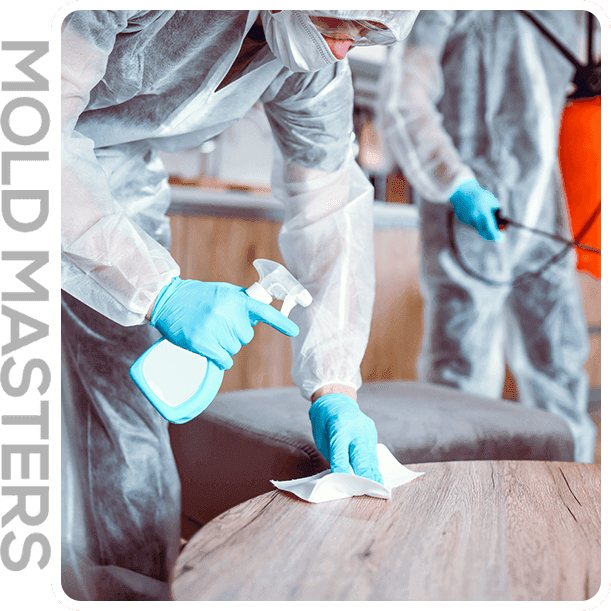
Biohazard & Crime Scene Cleanup in Knoxville
.2408211132550.jpg)
Residential and Commercial Biohazard Cleanup Solutions in Eastern Tennessee
Biohazard cleanup is an essential process in various scenarios where exposure to hazardous biological substances could pose serious health risks. Common situations requiring professional biohazard cleanup include the aftermath of crime scenes where biological fluids have been present, as well as suicides and hoarding scenarios.
At Mold Masters, we recognize the sensitive nature of many of the circumstances that require biohazard cleanup and are here to make this process as efficient and painless as possible. Our experienced and compassionate cleaning specialists have the training, equipment, and expertise needed to safely remove and dispose of hazardous materials. We comply with all applicable health regulations and are also prepared to disinfect the affected areas if necessary.
Our team is available 24/7, so do not wait to call (865) 351-6344 or contact us online if you need biohazard cleanup in Knoxville.

Hear From Our happy Customers
-
“They responded very quickly, worked around the GC’s schedule, got the job done and we didn’t experience any delays to our construction schedule.”- Andy S.
-
“They did great!! Loved working with them.”- Amy M.
-
“Amazing customer service, knowledgeable, and kept in contact with me throughout the job!”- Aaron W.
-
“My crawlspace was a disaster, Mold Masters made it like brand new.”- Michael B.
What Are Biohazards?
A biohazard refers to any biological substance that poses a threat to the health of living organisms, primarily humans. These hazards can come in various forms, including bacteria, viruses, fungi, and other microorganisms that can cause disease. In situations where these substances are present, professional cleanup is needed to mitigate the risk of exposure and contamination.
Below is a list of common types of biohazards that require specialized cleanup protocols:
- Bloodborne pathogens. These include infectious agents found in human blood that can lead to severe health issues, such as HIV, hepatitis B, and hepatitis C. Cleanup in incident scenarios, such as accidents or violent crimes, necessitates specialized training and equipment to safely handle contaminated blood and bodily fluids.
- Infectious waste. This category refers to materials that may be contaminated with pathogens and is typically relevant in healthcare environments. Contaminated dressings, syringes, or laboratory cultures require proper disposal and cleaning to prevent the spread of infection.
- Chemical hazards. While not strictly biological, many chemical hazards can also pose significant health risks. For instance, methamphetamine labs often produce biohazards from both the drugs and the chemicals used in their production. Cleanup requires a thorough understanding of both biological and chemical safety protocols.
- Hoarding debris. In extreme cases of hoarding, accumulated organic waste can lead to the growth of mold and bacteria, creating a hazardous environment. Professional biohazard teams are necessary to safely decontaminate these areas and restore the safety of the living space. We offer mold removal and remediation services that can prove crucial in these scenarios.

What Are the OSHA Guidelines for Biohazard Cleanup?

The Occupational Safety and Health Administration (OSHA) has established comprehensive guidelines to promote safety during biohazard cleanup operations. These regulations are crucial for protecting workers from exposure to hazardous biological materials.
Here are the key components of OSHA guidelines relevant to biohazard cleanup:
- Bloodborne Pathogens Standard (29 CFR 1910.1030). This standard mandates that employers maintain a written exposure control plan, which outlines how to minimize worker exposure to bloodborne pathogens. This includes identifying tasks that may involve exposure and implementing safety measures, such as offering vaccinations for hepatitis B and providing appropriate personal protective equipment (PPE) to employees.
- Personal protective equipment (PPE). OSHA requires that employers assess the hazards associated with biohazard cleanup and provide appropriate PPE to their workers. This may include gloves, masks, goggles, face shields, and protective clothing. It is mandatory that workers are trained on how to properly use and dispose of this equipment to prevent contamination.
- Decontamination procedures. Proper decontamination protocols must be established to handle potentially infectious substances. Cleaning solutions used must be effective against the specific pathogens encountered, and contaminated surfaces should be cleaned and disinfected following established procedures to eliminate risks of exposure.